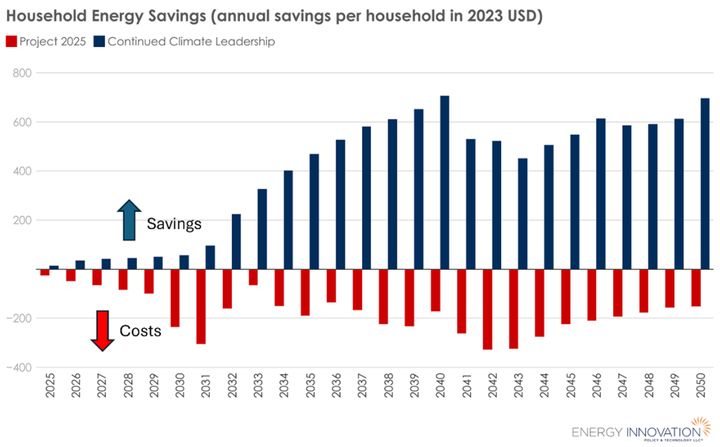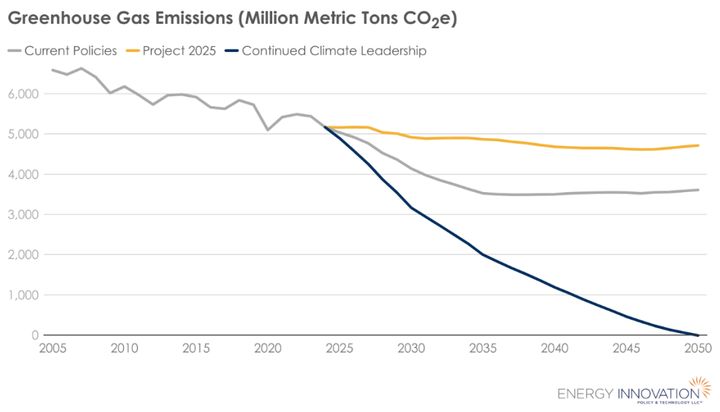Project 2025 ― the plan that Republican operatives have drafted as a policy blueprint for a second Trump administration ― would raise Americans’ household energy spending by billions of dollars per year, all while increasing planet-heating emissions by billions of tons and costing the U.S. economy millions of jobs, a new analysis has found.
Gutting federal policies meant to encourage a shift toward greener electricity and electric cars would increase U.S. household spending on fuel and utilities by about $240 a year by 2030, jacking up nationwide costs by a combined $32 billion per year compared to the current trajectory.
By contrast, if the U.S. beefs up its existing climate policies enough to meet its 2030 pledge to halve its emissions, Americans will save $60 per year by the end of this decade. The savings are projected to grow over time: By 2050, U.S. household energy spending would decrease by $700 per year ― delivering cumulative nationwide savings of $110 billion per year.

The findings, published Tuesday by the nonpartisan climate-modeling think tank Energy Innovation, offer stark new evidence against the Trump campaign’s promise to lower U.S. energy prices by reversing President Joe Biden’s landmark climate-spending laws and ramping up fossil fuel production beyond already-record levels.
“Even if we increase oil and gas production in line with what’s outlined in Project 2025, we’re still looking at higher household energy spending,” Robbie Orvis, Energy Innovation’s senior director of modeling and analysis, told HuffPost.
“And that’s compared to current policies,” he added. “If you contrast that with a continued climate leadership scenario where we’re deploying even more clean energy, those are really very big differences.”
Current policies will only get the U.S. halfway to its pledge to the rest of the world to halve its emissions by 2030, the report found, meaning additional regulations and legislation are required to meet the goal.

But Trump’s plan to scrap existing policies would increase emissions by about 780 million metric tons per year by the end of this decade, roughly equal to adding the annual pollution of about 200 coal-fired power plants.
Compared to a scenario in which the U.S. enacts enough new policies to meet its 2030 pledge, as Democratic presidential nominee Kamala Harris has promised, Project 2025 would increase annual emissions by the equivalent of 452 coal-fired stations.
The trillions of federal dollars contained in Biden’s trio of industrial policy laws ― the Inflation Reduction Act, the semiconductor-focused CHIPS and Science Act, and the Bipartisan Infrastructure Law ― have already set off a manufacturing boom, with droves of new factories to make solar panels and batteries announced thus far.
Following Project 2025’s blueprint for eliminating key policies from those laws would reduce the number of new jobs in the U.S. by 1.7 million in 2030, the analysis found. But enacting more climate policies to meet the 2030 target would add 2.2 million jobs ― a difference of 3.9 million jobs in all.
“We’re at a bit of a crossroads here,” Orvis said. “The common refrain is that clean energy is bad for the economy, that it raises energy spending and that it costs jobs. That is just not true.”
Disclaimer: The copyright of this article belongs to the original author. Reposting this article is solely for the purpose of information dissemination and does not constitute any investment advice. If there is any infringement, please contact us immediately. We will make corrections or deletions as necessary. Thank you.
